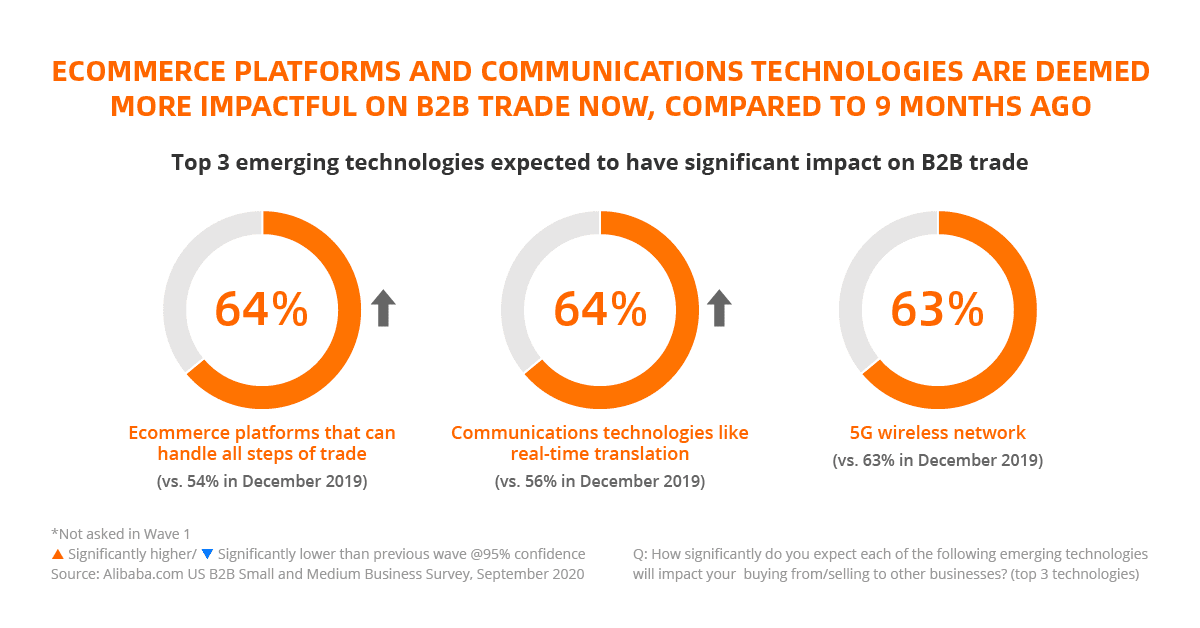

B2B companies have been reluctant to adopt online buying and selling. They favored doing business offline and meeting face-to-face. So the COVID-19 pandemic presented quite a challenge for these companies: B2B buyers and sellers could no longer travel to get to know one another in person. They needed a new way to build relationships and reach their customers, so B2B companies went digital and turned to ecommerce.
According to our recent Alibaba.com US B2B Small and Medium Business (SMB) Survey, 93% of 5,015 B2B companies are now conducting some portion of their business online — up from 90% in December 2019. Not only has B2B commerce become more digital, 80% of respondents reported maintaining or growing online B2B transactions in the past six months.

Our survey also showed more and more B2B companies leaving behind the traditional methods of connecting with new buyers, like email and in-person trade shows. Instead, they’re increasingly relying on digital technologies like websites, mobile apps, and ecommerce marketplaces like Alibaba.com. They believe ecommerce marketplaces and communications technologies are now deemed more impactful on B2B trade compared to nine months ago. In fact, the B2B companies we surveyed expect these emerging technologies to be just as influential as 5G wireless technology.

A recent McKinsey article explains that B2B ecommerce marketplaces “offer several general benefits to business...hours and time zones are irrelevant, making marketplaces truly global.” And according to our survey, that’s a key reason B2B SMBs are getting digital. While access to customers, increased profits, and reduced need to travel were some of the main reasons to go digital, reaching international markets saw the greatest increase in importance — from 20% to 27%.
Take Rashee Gupta, Founder of MGS Accessories, for instance. Initially Rashee started using Alibaba.com as a buyer to source packaging and materials for her vegan and cruelty-free makeup line. After launching her first product and seeing some initial success selling on her website, sales slowed and Rashee needed an alternative. She decided to try selling her products on Alibaba.com in January 2020, and Rashee’s business turned around.
Selling on Alibaba.com helped Rashee expand her business both internationally and domestically. She’s even expanded to India, a dream of Rashee’s since founding MGS Accessories. According to Rashee, “MGS Accessories was in the red before we joined Alibaba.com. Sales were very slow. Now, we have the opposite problem. We’re so busy we can’t keep up!” Alibaba.com now accounts for 50% of Rashee’s sales.
Using a B2B ecommerce marketplace means access to powerful tools that benefit both buyers and sellers of every size. Sellers can set up a digital storefront for thousands of buyers to pass through and browse products. Buyers placing large orders with international sellers can take advantage of sophisticated shipping and logistics services. Different finance options, like payment terms, are available to businesses who need more time to pay and want to boost their cash flow. Simply put, buying and selling on a B2B marketplace means access to a suite of tools built just for B2B trade.
The bottom line? Getting digital is no longer a nice-to-have, but a must-have. B2B SMBs need to digitize to remain competitive. But more than that, B2B SMBs need to start using online marketplaces to grow their businesses, expand into new markets, and take the next step into the digital age.
This week's #B2BTuesday Tip:
One way small businesses can move from main street to a truly global presence is to go through an ecommerce marketplace.


